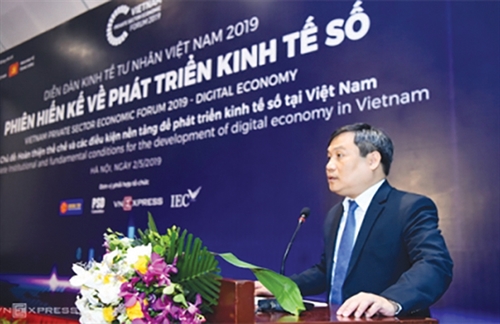
By 2025, Vietnam would be ranked among top 4 ASEAN countries regarding national digitization and make a breakthrough transformation toward a digital country with a vision to 2030.
By 2025, Vietnam would be ranked among top 4 ASEAN countries regarding national digitization and make a breakthrough transformation toward a digital country with a vision to 2030.
 |
| Deputy Minister of Information and Communications Nguyen Thanh Hung addresses at a conference on development of digital economy in Vietnam__Photo: Internet |
It is one of the targets set in a draft scheme on national digital transformation prepared by the Ministry of Information and Communications.
The scheme targets that by 2025, digital technology would make up 25 percent of GDP, half of small- and medium-sized enterprises (SMEs) would operate in digital platforms and at least 80,000 digital businesses would be developed nationwide. The country would jump 10-15 places to be ranked in the ASEAN-4 countries in the United Nation’s E-Government Index. Electronic medical records would be used in all of class-1 hospitals while health profiles would be accessible from health facilities across the country. Fifth-generation (5G) mobile networks would cover most of the country with new services, and cloud computing would be widely applied in all enterprises and state agencies to ensure security in the course of digital transformation. The country will become an information safety and security hub in ASEAN.
Under the draft, the scheme would be implemented in three phrases.
In the first phase (2019-20), efforts would be concentrated on digitization of industrial sectors and digital transformation of the economy, society and state agencies in order to improve operational efficiency, increase productivity and create new sources of growth. Specific works would include developing infrastructure platforms, building the legal environment, supporting enterprises, especially SMEs, in digital transformation, and developing digital startups and digital human resources.
During the second phase (2021-25), digitization would become an advantage in both domestic and global competition. The country’s competitiveness would be improved by deployment of new integrated digital ecosystems. To this end, businesses would be encouraged to transform and move towards a digital platform/ecosystem model, thus forming convergent value chains.
By the end of the third phase (2026-30), a comprehensive digital economy and society would be formed with new-generation digital industries such as artificial intelligence, immersive media and Internet of things, serving as the driving forces for economic growth.
Under the draft, the scheme would be implemented in three phrases.
In the first phase (2019-20), efforts would be concentrated on digitization of industrial sectors and digital transformation of the economy, society and state agencies in order to improve operational efficiency, increase productivity and create new sources of growth. Specific works would include developing infrastructure platforms, building the legal environment, supporting enterprises, especially SMEs, in digital transformation, and developing digital startups and digital human resources.
During the second phase (2021-25), digitization would become an advantage in both domestic and global competition. The country’s competitiveness would be improved by deployment of new integrated digital ecosystems. To this end, businesses would be encouraged to transform and move towards a digital platform/ecosystem model, thus forming convergent value chains.
By the end of the third phase (2026-30), a comprehensive digital economy and society would be formed with new-generation digital industries such as artificial intelligence, immersive media and Internet of things, serving as the driving forces for economic growth.
(Source:VLLF)




